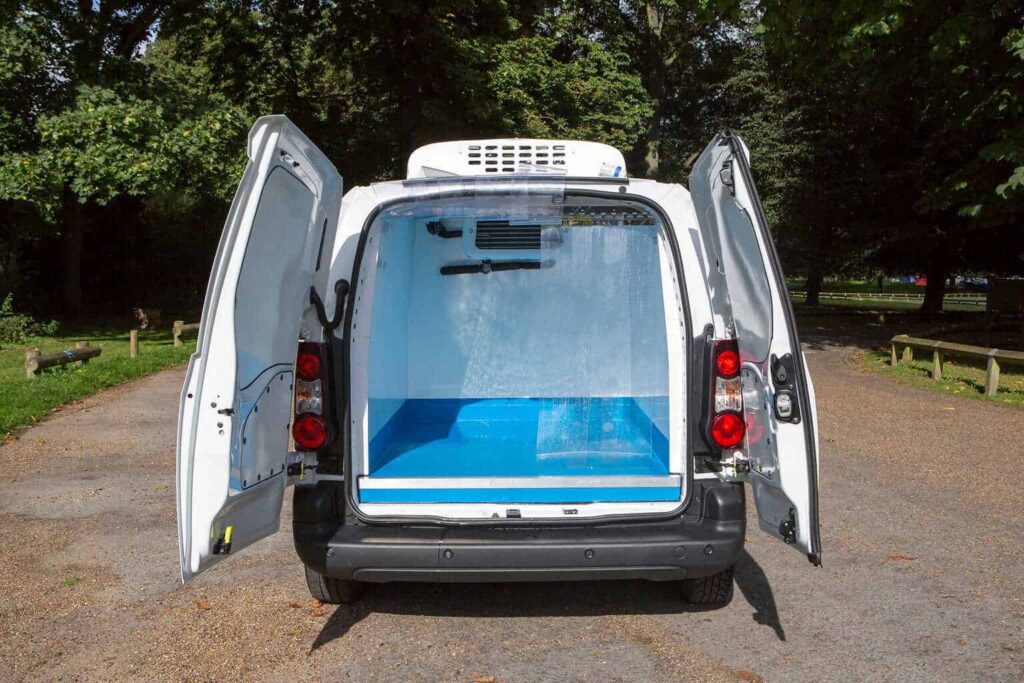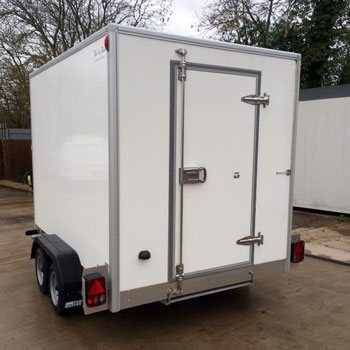Refrigerated vans are indispensable assets for businesses that rely on the safe transportation of perishable goods. Maintaining these vehicles in top condition is crucial, not only to ensure the longevity of the van but also to guarantee the integrity of the goods transported by your business.
Proper maintenance helps prevent breakdowns and performance issues, which are vital for businesses looking to avoid the costly consequences of delayed deliveries and spoiled products due to time off the road.
Operations Director, Craig Diaz, highlights the commitment to excellence, stating,
“Maintaining every aspect of a refrigerated van, from the mechanical components to the refrigeration unit, is essential. We ensure that our fleet remains in prime condition so our clients can focus on their business without concern for the transportation of their goods.”
Here are FridgeXpress’s tips for keeping on top of your van’s service and maintenance and keeping your business on the road.
Regular Maintenance Schedule
As with any vehicle, regular maintenance is critical for helping you stay on the road and operate in optimal performance.
Daily Checks
To ensure optimal performance and safety, certain components of a refrigerated van require daily inspection. This checklist should include:
- Refrigeration Unit: Check for any unusual noises or signs of leaks, and verify that the temperature controls are functioning correctly.
- Tyres: Inspect for adequate tread depth and any signs of wear or damage, and ensure they are inflated to the correct pressure.
- Battery: Check the battery level and look for any signs of corrosion on the terminals, as a well-functioning battery is crucial for reliable starts and overall electrical health.
Monthly Inspections
Monthly inspections allow for a deeper assessment of the van’s condition, focusing on:
- Coolant Levels: Ensure that the engine coolant is at the required level to prevent overheating, which is critical for the overall health of the van.
- Hose Conditions: Check all hoses for any signs of wear, leaks, or brittleness, as these can lead to fluid loss and engine failure.
- Door Seals: Inspect the door seals for any tears or damage. Proper sealing is essential to maintain the refrigerated environment and ensure energy efficiency.
Annual Professional Servicing
Scheduling an annual professional servicing is imperative for comprehensive maintenance:
- A qualified technician can perform a thorough check of the engine, refrigeration unit, and electrical systems to identify and rectify any underlying issues.
- This service should include changing the oil, replacing filters, and checking brakes and suspension, which are crucial for the safety and longevity of the vehicle.
- Professional servicing helps to ensure that the van meets all legal standards and runs efficiently, which can significantly reduce the likelihood of costly breakdowns and extend the vehicle’s service life.
Adhering to this maintenance schedule helps safeguard the functionality and reliability of refrigerated vans, thereby supporting the seamless operation of businesses that depend on the safe and efficient transport of temperature-sensitive goods.
Craig Diaz, elaborates on the benefits of long-term hiring, stating,
“Opting for long-term hire of your refrigerated van from FridgeXpress is not just cost-effective; it’s a strategic decision. We take full responsibility for all maintenance requirements, ensuring each van performs optimally throughout the hire period. This commitment removes the burden of upkeep from our clients, allowing them to focus solely on their operations, confident in the reliability and efficiency of their transport solutions.”
Check out our post: Refrigerated Vans: Buying Vs Renting for more information.
Refrigeration Unit Maintenance
Of course, these vans come with an additional need for maintenance as far as the refrigeration unit is concerned. This can be a little more complicated.
Keeping the Unit Clean
Maintaining the cleanliness of the refrigeration unit is essential for its efficiency and longevity. Here’s a step-by-step guide on how to clean the condenser and evaporator:
- Turn Off the Unit: Ensure the refrigeration unit is turned off before you begin cleaning.
- Access the Condenser and Evaporator: Open the service panels to expose the condenser and evaporator.
- Remove Debris: Use a soft brush or a vacuum with a brush attachment to gently remove dust and debris from the coils.
- Spray with Coil Cleaner: Apply a commercially available coil cleaner according to the manufacturer’s instructions. Let the cleaner sit for the time specified to break down any remaining dirt and grease.
- Rinse Thoroughly: If accessible and appropriate based on cleaner instructions, rinse the coils with water using a low-pressure spray. Ensure all traces of the cleaner are removed to prevent corrosion.
- Dry and Replace Panels: Allow the coils to dry completely before replacing the service panels.
Checking and Replacing Refrigerant
Refrigerant is crucial for the proper functioning of refrigeration units. To check the refrigerant levels and determine if it needs replacement, follow these guidelines:
- Check for Leaks: Regularly inspect the unit for signs of refrigerant leaks, such as oil stains around connections, which can indicate a problem.
- Measure Pressure: Use gauges to measure the pressure in the refrigeration system. Compare these readings with the specifications provided by the manufacturer.
- Seek Professional Assistance: If the refrigerant levels are low or there are signs of leakage, contact a certified technician to handle the refrigerant replacement. Handling refrigerants typically requires special certification due to their hazardous nature.
Battery Care
The battery is a critical component that powers the refrigeration unit. To maintain its functionality:
- Regular Checks: Regularly check the battery terminals for corrosion and clean them with a solution of baking soda and water if necessary.
- Keep It Charged: Ensure the battery is always charged, especially during colder months, as low temperatures can reduce battery performance.
- Replace If Necessary: Batteries have a limited lifespan. Monitor the battery’s performance and replace it when you notice it struggles to hold a charge or starts the unit with difficulty.
Proper maintenance of the refrigeration unit is essential not only for the safe transport of perishable goods but also for the economic operation of the refrigerated van. Regular attention to cleaning, refrigerant levels, and battery health will help ensure that the unit operates efficiently and reliably.
Check out our amazing blog: What Are Refrigerated Vans?
Van Maintenance
Any business that runs a vehicle for their operation will understand the importance of regular maintenance and this is no different for refrigerated vans.
Engine and Mechanical Integrity
Regular engine and mechanical maintenance are crucial for the longevity and efficiency of your refrigerated van. Here are some key practices:
- Regular Oil Changes: Follow the manufacturer’s guidelines to determine the frequency of oil changes based on your van’s usage patterns.
- Check Fluid Levels: Regularly check and top up fluids, including engine coolant, brake fluid, and power steering fluid, to ensure the van operates smoothly.
- Inspect Belts and Hoses: Look for signs of wear and tear on belts and hoses. Replace them if they show signs of fraying, cracks, or brittleness to prevent breakdowns.
- Brake Checks: Ensure the braking system is regularly inspected and maintained. This is vital for the safety of the vehicle, especially when carrying heavy loads.
Bodywork and Insulation
The bodywork and insulation of a refrigerated van are essential in maintaining the required internal temperature and reducing energy use:
- Inspect for Damage: Regularly inspect the bodywork for any damage, such as dents or corrosion, which could compromise the van’s structural integrity and insulation.
- Check Insulation: Ensure that the insulation material within the van’s panels is intact. Look for any signs of moisture ingress or mould, which can indicate compromised insulation.
- Seal Integrity: Regularly check and maintain door seals and gaskets to prevent cool air from escaping. Replace any seals that are worn or damaged.
Interior Hygiene
Maintaining the cleanliness of the interior of a refrigerated van is essential to prevent contamination and ensure that it remains a safe environment for transporting perishable goods:
- Regular Cleaning: Clean the interior surfaces with appropriate sanitisers to remove bacteria and prevent odours. This is especially important in the food transport industry.
- Avoid Contamination: Use protective coverings for the flooring and walls to protect against spills and stains, which can become breeding grounds for bacteria.
- Ventilation: After cleaning, ventilate the interior well to prevent moisture build-up, which can lead to mould and mildew.
Adhering to these maintenance practices will help ensure that the refrigerated van remains in excellent condition, thereby safeguarding the goods transported and extending the vehicle’s operational lifespan.
Seasonal Considerations
Winter months pose specific challenges for the operation of refrigerated vans, necessitating thorough preparation:
- Antifreeze Levels: Ensure that your van’s coolant system is filled with antifreeze to prevent the engine from freezing.
- Battery Check: Cold weather can severely impact battery performance. Test the battery and replace it if necessary to avoid start-up issues.
- Tyre Condition: Consider switching to winter tyres that offer better traction and control in icy or snowy conditions. Also, check the tyre pressure regularly, as it tends to decrease in colder temperatures.
- Heater and Defrosters: Verify that the van’s heating system and window defrosters are working correctly to ensure driver visibility and comfort.
Craig Diaz notes,
“Winter can be particularly challenging for drivers. Ensuring your refrigerated van is well-prepared for the season not only enhances safety but also maintains the reliability of your transportation service during these colder months.”
Summer Maintenance
The summer season requires attention to different aspects of the van to ensure the refrigeration unit remains efficient:
- Air Conditioning System: Regularly check the air conditioning system to ensure it is functioning efficiently, as it plays a crucial role in maintaining optimal temperatures inside the cabin and the cargo area.
- Coolant System: Inspect the coolant system for leaks and ensure it is filled to the appropriate level to prevent overheating.
- Clean the Condenser: Dust and debris can accumulate on the condenser during dry summer months; clean it regularly to maintain airflow and cooling efficiency.
- Window Tints and Shades: Consider using window tints or shades to reduce solar gain inside the van, which can help the refrigeration unit run more efficiently.
Troubleshooting Common Issues
Understanding how to identify and troubleshoot common issues in refrigerated vans is essential for maintaining their optimal function:
- Fluctuating Temperatures: Regularly monitor the temperature readings. If you notice inconsistent temperatures, check the door seals, refrigerant levels, and thermostat settings.
- Unusual Noises: Listen for any strange noises coming from the refrigeration unit. Buzzing or rattling can indicate loose components while hissing might suggest a refrigerant leak.
- Power Issues: If the refrigeration unit has trouble starting or maintaining power, inspect the battery and electrical connections for any signs of corrosion or loose wires.
Why Partner with FridgeXpress
If you’re considering the long-term hire of a refrigerated van, FridgeXpress offers a reliable solution with comprehensive maintenance included. With over 20 years of experience and coverage across the UK, FridgeXpress stands out for its expertise and dedicated customer support.
Craig Diaz encapsulates the benefits:
“Choosing FridgeXpress for your refrigerated van needs means more than just hiring a vehicle. It’s about gaining a partner that brings decades of expertise and a commitment to quality service, ensuring your operations run smoothly wherever you are in the UK.”




